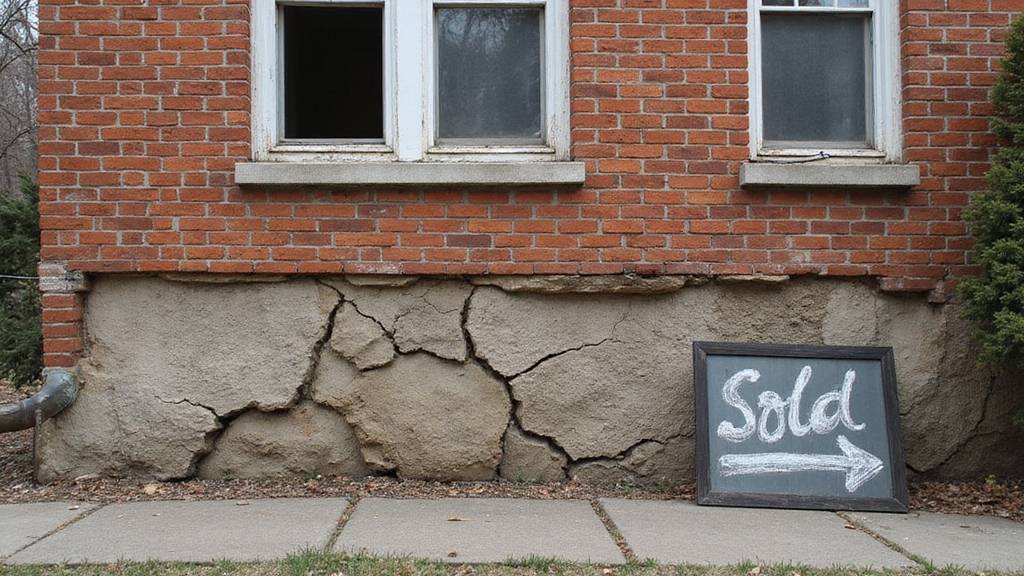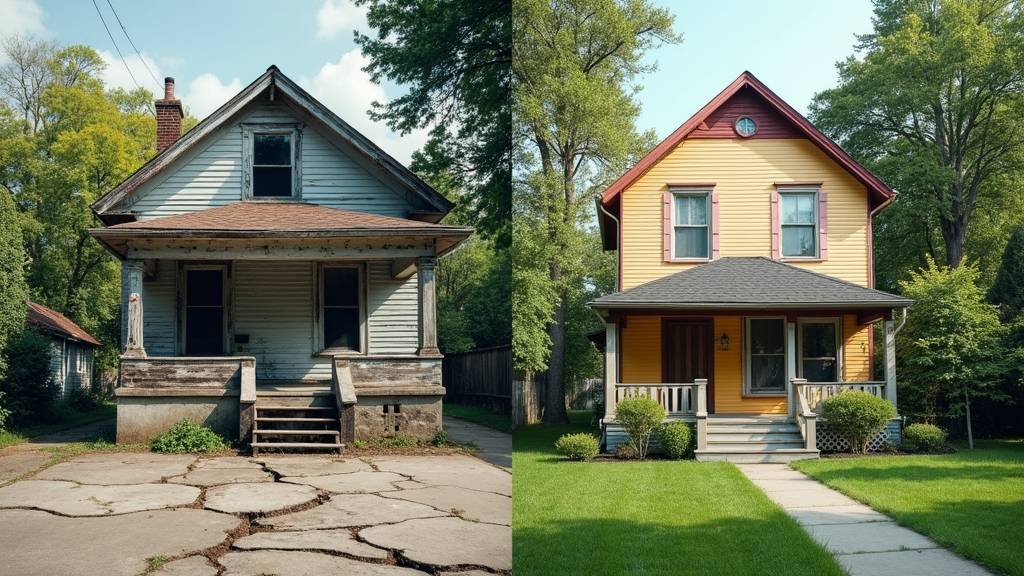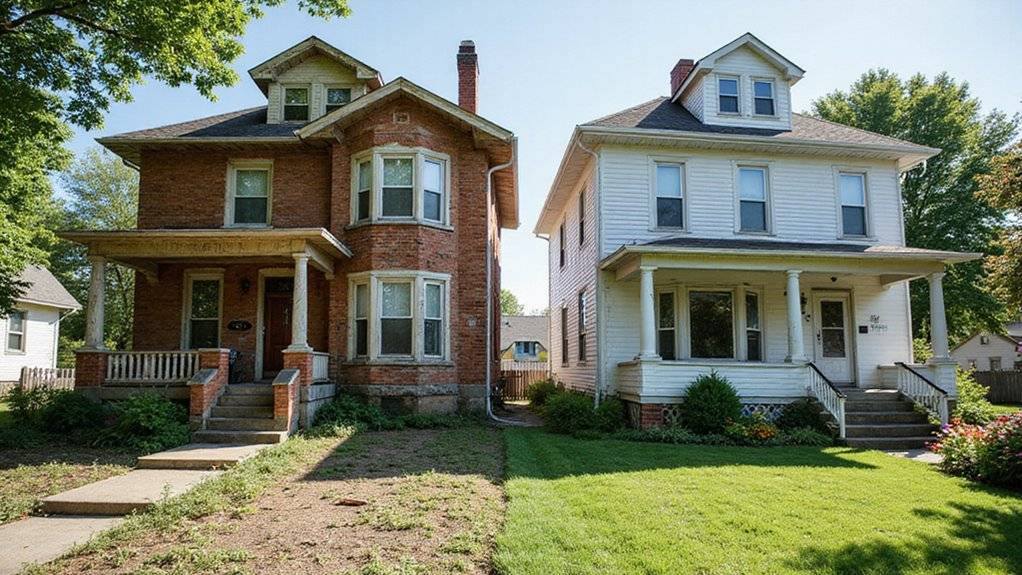Selling a house can be stressful, but foundation damage makes it even tougher. Many homeowners do not realize how much this issue affects their sale. It can turn a quick move into a long, complicated process.
Buyers often worry about costly repairs or hidden risks. This fear shrinks your buyer pool and lowers your home’s value. You may face steep negotiations and longer wait times compared to a regular home sale.
Selling a house with foundation damage is very different from a traditional sale because it attracts different buyers and changes your selling strategy.
The good news is, you have options to protect your finances and speed up the process. Knowing your choices helps you make the right move from the start.
This blog will explain how to handle foundation damage so you can sell your home with less stress and better results.
Key Takeaways
- Homes with foundation damage often sell for 10-30% less than traditional sales due to repair costs and reduced buyer confidence.
- Selling with foundation issues usually attracts mainly investors or cash buyers, whereas traditional sales appeal to a broader pool of buyers.
- Lenders may deny mortgages for homes with structural problems, complicating traditional financing and limiting buyer options.
- Foundation damage requires legal disclosures and can lead to longer sale timelines compared to standard home sales.
- Repairing the foundation before selling increases marketability, raises sale price, and improves chances of loan approval versus selling as-is.
Understanding Foundation Damage and Its Impact

Foundation damage can lower your home’s value and make selling harder. If buyers see problems, they may lose trust in your property. Serious cracks or uneven floors can lead to a lower sale price. Visible foundation issues can drive down your home’s value and make it more difficult to attract confident buyers.
Common causes include shifting soil, poor drainage, or weak materials. These issues can get worse if you ignore them. Repairs may become more expensive over time.
If you find foundation problems, address them quickly. Fixing damage can protect your investment and help you sell faster. If you act early, you may avoid bigger costs later.
Being open about repairs can reassure buyers and smooth the selling process. Honest information can attract serious offers. If you prioritize stability, you protect your home’s value. Addressing co-ownership disputes can also be crucial if disagreements arise during the sale process.
Common Signs of Foundation Problems
Spotting foundation problems early helps you avoid expensive repairs when selling your home. You should know the signs of foundation damage before listing. Early detection by a professional can prevent delays and extra costs during the sale.
A structural engineer can check your home and suggest solutions if problems are found. Common signs include visible cracks, uneven floors, and doors or windows that stick. If you notice these issues, schedule a foundation inspection right away.
Here is a table to help you spot warning signs:
| Visible Cracks | Uneven Floors | Sticking Doors/Windows |
|---|---|---|
| Cracks in exterior brick | Sloping or sagging floors | Doors that do not close properly |
| Cracks on interior walls | Gaps in tile or wood floors | Windows that are hard to open |
| Stair-step cracks | Floors that feel bouncy | Frames that look crooked |
| Gaps above windows | Floors separating | Doors that do not latch |
If you see any of these signs, consult a structural engineer as soon as possible. Acting quickly can help you fix problems before they get worse. Foundation assessment is a crucial step in maintaining your home’s integrity and ensuring a smooth sale process. Being aware of foundation damage can also help you make informed decisions whether you choose a traditional sale or sell to a company like ours that buys houses as-is.
How Foundation Issues Affect Home Value

Foundation problems can lower your appraisal value by as much as 10-15%, giving buyers significant influence in negotiations. You’ll also notice a smaller pool of interested buyers, since many are wary of costly repairs. Understanding these impacts lets you price your home strategically and prepare for effective negotiations.
Additionally, considering options like selling your house fast to a home buyer who purchases properties in any condition can help you avoid lengthy repairs and streamline the selling process. When selling a property with a land contract, it’s important to review the contract terms to ensure the sale complies with legal requirements and protects your interests.
Impact on Appraisal Price
Foundation problems lower a home’s appraised value. Appraisers often reduce the price by 10% to 20% when damage is present. This makes the property less valuable than similar homes without issues.
Visible cracks, sloping floors, or damp spots are warning signs for appraisers. Repair estimates are subtracted from the home’s value. If the damage is not fixed, lenders might decline mortgage applications.
Sellers who repair the foundation before selling may see less of a price drop. Addressing issues early can help attract more buyers. Timely repairs lead to a higher appraisal and smoother sale process.
Buyer Negotiation Leverage
Buyers have more power to negotiate when a house has foundation issues. They worry about repair costs and future problems. This often leads them to offer less money.
Homes with visible structural problems can sell for 10%–20% less than similar homes nearby. Even with home staging, buyers may use inspection reports to lower their offers. They often mention possible repairs and extra hassle.
Sellers can reduce buyer leverage by getting contractor estimates before listing. If you share these details openly, buyers may feel more comfortable. Clear information helps justify your asking price and limits low offers.
Marketability and Buyer Pool
Structural damage makes it much harder to attract buyers. Foundation problems can lower your home’s value by 20%–30%. Fewer buyers are interested because of the risks and repair costs.
Many lenders will not give loans for homes with structural issues. If an inspection report shows foundation problems, most buyers will walk away. Even if the neighborhood is great, these issues matter most.
Staging the home will not hide major foundation problems. It can help buyers see the home’s potential if you fix the damage. If you choose not to repair, consider lowering the price for investors.
Repairing the foundation can help you reach more buyers. If you do not repair it, expect a smaller buyer pool. Investors may be interested if they see an opportunity for profit.
Disclosure Requirements for Foundation Damage

You’re legally required to disclose any known foundation damage when selling your home, and failing to do so can result in lawsuits or delayed sales. According to the National Association of Realtors, 89% of buyers consider honest disclosures essential to their decision-making.
By addressing these requirements up front, you protect yourself and help buyers make informed choices. Proper documentation of asbestos presence and condition can also be crucial in similar disclosures related to potential hazards. Additionally, providing comprehensive home condition reports can streamline the selling process and reduce post-sale disputes.
Legal Obligations for Sellers
Sellers must tell buyers about any known foundation damage when selling a house. State laws require you to share all structural problems honestly. Not following these rules can lead to lawsuits or canceled sales.
You should complete a disclosure form that lists any foundation cracks, settling, or past repairs. If you hide or leave out important information, buyers may take legal action. A full and honest disclosure protects you from future problems.
A professional home inspection can help find hidden structural issues. The inspection report gives proof of your home’s condition. This helps you meet all legal requirements and reduces your risk.
Buyers usually get to see your disclosures before the sale is final. If you are accurate and clear, you protect yourself legally. Stay honest and careful to avoid legal trouble.
Impact on Buyer Decisions
Full disclosure about foundation damage strongly affects how buyers make decisions. Buyers want to know about any major issues before making an offer. Honest information helps them decide if the home is right for them.
If you tell buyers about foundation problems early, you build trust. Providing a recent structural assessment can prevent surprises later. This may lower the chance of a sale falling through.
Buyers often compare repair costs to the home’s value. If you have fixed the issue or have clear repair estimates, buyers feel more comfortable. Transparency helps buyers make confident choices and can lead to a smoother sale.
Attracting Buyers With Foundation Concerns
Foundation concerns may make it harder to attract buyers. However, clear information and preparation can help you find serious buyers. If you address concerns directly, you can build trust and interest.
Sellers should provide a recent structural report from a licensed engineer. Buyers feel more confident when they see documented repairs or recommendations. Sharing these documents shows that you are honest about the property’s condition.
If possible, offer buyers a chance to speak with a trusted contractor. This reassures them about the true scope of the issue. It also gives buyers a clearer idea of repair costs.
Highlight other strong points of your home, such as location, size, or recent upgrades. These features can balance concerns about the foundation. With these steps, your home will stand out to buyers despite foundation issues.
Understanding the importance of transparency in disclosure requirements can further improve buyer confidence and facilitate a smoother sale process.
Pricing Strategies for Homes With Structural Issues
Homes with structural issues need careful pricing to attract buyers. Buyers usually lower their offers to cover repair costs and risks. If you price your home right, it will sell faster and for a fair value.
A professional should check the foundation to see how bad the damage is. You will get a repair estimate, which often ranges from $2,000 to $7,000. Serious repairs may cost over $20,000. Knowing the extent of damage can help you set a realistic price.
If you deduct repair costs from your home’s market value, you will set a realistic price. Sellers should share the inspection report and repair quote with buyers. This honesty can build trust and help your home stand out.
Understanding market challenges and pricing accordingly is crucial to avoid your home sitting on the market for too long. If you price the home too high, it may sit on the market too long. If you price too low, you might lose money. Use recent sales of similar homes with issues to help set your price.
Inspection and Appraisal Differences
Understanding the difference between an inspection and an appraisal is important when selling a house with foundation damage. An inspection checks your home’s condition and finds any structural issues. An appraisal estimates your home’s market value, including the effects of foundation problems. Proper documentation of repairs and assessments can help support your sale and clarify the property’s value.
Inspections help you learn what repairs are needed and how much they may cost. Appraisers will factor in the foundation damage when setting your home’s value. If you have foundation issues, your property’s value could drop by 10% to 15%. This potential decrease highlights the importance of understanding capital gains tax implications and how they relate to property value changes.
Insurance claims can affect both inspections and appraisals. Inspectors and appraisers may review past repairs or ongoing insurance claims. These claims could help pay for repairs and impact the reports. Additionally, home repair costs can influence the valuation and your ability to sell on terms that suit your situation.
Negotiating Repairs or Credits With Buyers
When buyers uncover foundation issues, you can keep negotiations on track by offering repair credits or adjusting the sale price. National data shows that credits or price reductions often close deals faster than agreeing to complete repairs yourself. By presenting clear options, you’ll address buyer concerns and increase your chances of a successful sale.
Additionally, working with a trusted local investor who understands the West County market can help facilitate a smooth transaction even with foundation problems. This approach can be especially effective when dealing with houses in any condition, as it highlights your flexibility and willingness to find mutually beneficial solutions.
Offering Repair Credits
Offering repair credits can help you sell a home with foundation damage. Buyers get money at closing to fix the issue themselves. This makes negotiations easier and keeps the sale moving forward.
A recent inspection report should show the repair needs and costs. Buyers can then choose their own contractor for the work. This gives them control over repairs and materials.
If repair grants are available, mention them to buyers. These grants lower repair costs and can make your home more attractive. Always provide buyers with all grant details upfront.
Price Adjustments Strategies
Foundation damage lowers a home’s value, so you must adjust your price or offer repair credits. Use recent sales of similar homes to set a fair price. If buyers know about the damage, they often subtract repair costs from their offers.
Repair costs can range from $4,000 to $25,000. You should also consider costs like fixing the yard after repairs. If repairs affect landscaping, include those expenses in your price adjustment.
A clean and well-staged home can reduce buyer worries. Strategic staging shows the home’s potential even with known issues. Sellers should stay open and honest about any damage.
Offering repair credits or a lower price can help close deals faster. If you are flexible in negotiations, you may avoid delays. Price adjustments make your home more competitive with other listings.
Financing Challenges for Damaged Properties
Lenders see properties with damage as risky, so getting a normal loan is hard. Most banks will not approve loans if a home’s structure is not sound. They use the house as security for the mortgage.
Appraisers may point out foundation problems during the inspection. Buyers using FHA, VA, or regular loans may have to back out if repairs are needed. High repair costs can scare away both buyers and lenders.
Buyers could look for renovation loans or use hard money lenders if normal financing is denied. Lenders often want certified repair estimates before saying yes. Homes with damage often attract cash buyers who usually want a lower price.
Fixing foundation problems before selling can help you get more loan options. It may also make the sale process smoother and faster.
Additionally, understanding the sale-leaseback arrangement can provide alternative financial options, allowing homeowners to access their home equity without immediate repairs.
Working With Real Estate Agents Familiar With Foundation Issues
Real estate agents who understand foundation issues are valuable when selling a home with damage. They know how to handle repairs, pricing, and buyer concerns. If you choose such an agent, you increase your chances of a smoother sale.
These agents can read inspection reports and explain them to buyers. They will suggest reliable contractors for repairs if needed. Agents also know local market prices for homes with foundation problems.
Experienced agents are skilled at following disclosure laws. They can answer common questions from buyers about structural issues. If you want faster offers, you should hire an agent who has managed foundation cases before.
Selling As-Is Versus Making Repairs
When you decide whether to sell your house as-is or make repairs, you’re weighing immediate cost savings against potentially higher offers and a broader buyer pool. Data shows homes sold as-is often attract investors or cash buyers, but may sell for up to 30% less than repaired properties. By understanding these cost implications, you can choose the strategy that best fits your financial goals and timeline.
Cost Implications for Sellers
Selling a house with foundation damage can affect your finances in different ways. You might get less money if you sell as-is. If you fix the foundation first, you could sell for more, but you must pay repair costs upfront.
Foundation repairs usually cost about $4,500. In some cases, repairs could cost over $10,000 if the problem is severe. You should get a repair estimate before making any decisions.
Buyers often want a bigger discount than the repair cost if you sell as-is. If you have enough savings, repairing first might lead to a better offer. If money is tight, selling as-is could be the simpler choice.
Buyer Pool Differences
If you sell your house as-is with foundation damage, different buyers will be interested. Most buyers looking at damaged homes are investors or flippers. Traditional buyers usually want homes with no major issues.
Making foundation repairs attracts more traditional buyers. These buyers often use loans and look for move-in-ready homes. Repairs can help you reach a larger buyer pool.
If you keep the damage, investors and flippers will dominate. If you repair it, regular buyers become more interested. Lenders are also more likely to approve loans for repaired homes.
Marketing a Home With Foundation Problems
You can attract serious buyers even if your home has foundation problems. A clear plan helps highlight good features and address concerns. Buyers appreciate honesty about known issues.
Home staging can make your property look inviting. A staged home helps buyers see its possibilities. If buyers can picture living there, they may overlook some flaws.
Sellers should mention recent upgrades or special features that add value. Professional inspection reports and repair quotes increase trust. These documents show you are transparent and prepared.
Some buyers look for renovation projects. If you target investors, use online platforms that focus on fixer-uppers. The right strategy can increase your chances of selling.
Timeline Differences: Traditional vs. Damaged Homes
Selling a house with foundation damage usually takes longer than selling a home in good shape. The process requires extra steps, like a structural assessment and more legal paperwork. These steps can add weeks or months to your sale timeline.
A traditional home needs only basic preparation, while a damaged home needs a full assessment. The time on the market is often double or triple for damaged homes. Inspections and negotiations also take much longer for homes with issues.
If you want to sell faster, get a structural assessment early. Accurate legal disclosures can help avoid delays. Expect negotiations to take longer if repairs are needed.
Weighing Cash Offers Against Conventional Buyers
Cash buyers and conventional buyers have different pros and cons when buying a house with foundation issues. Cash buyers usually offer a faster, simpler sale. Conventional buyers may face more hurdles because of lender rules and inspections.
Cash buyers often skip some steps, such as mortgage approval. They may also accept the house as-is, even with damage. This means fewer delays and a higher chance of closing.
Cash buyers can move quickly, often accepting homes as-is and avoiding mortgage approval delays for a smoother closing process.
Conventional buyers depend on mortgage approval and home inspections. Lenders may refuse loans for homes with foundation problems. If buyers must follow strict lender rules, they could ask for repairs or a lower price.
Seller disclosures are important for both types of buyers. Conventional buyers might back out if they find major foundation issues. If you want a quick sale, a cash offer may suit your needs better.
Conclusion
If you need to sell a house with foundation damage, you can expect some challenges. Foundation issues reduce your buyer pool and can lower your sale price. If you understand your options, you can make a confident decision.
If you choose not to make repairs, you may want to consider selling as-is. Cash buyers or investors are often willing to purchase homes with structural problems. Traditional buyers may not be interested or could face financing issues.
If you want a fast and simple sale, we buy houses for cash at Freedom Path Investors. We can help you avoid costly repairs and close on your timeline. Contact us today to see how we can help you move forward.








